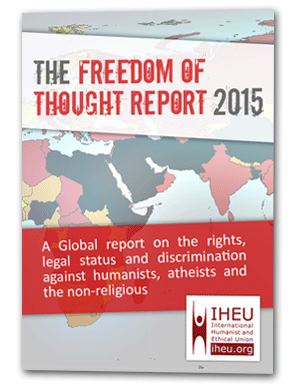2015 edition records trend toward “callous violence and harsh injustice”
 As the 2015 edition our the IHEU Freedom of Thought Report documents, persecution of the non-religious has escalated in the past year.
As the 2015 edition our the IHEU Freedom of Thought Report documents, persecution of the non-religious has escalated in the past year.
There has been a rise in extrajudicial violence, and in several states harsher judicial sentences have been handed down for crimes such as “blasphemy” and “apostasy” (leaving religion).
The Freedom of Thought Report 2015, produced by the International Humanist and Ethical Union (IHEU), records discrimination and persecution against humanists, atheists, and the non-religious, with a country-by-country assessment. (Read more about the Report.)
In the introduction, Bob Churchill writes:
“Last December, this Report warned of an apparent increase in hate speech and overt political marginalization targeting humanists, atheists, and proponents of secularist principles, including persecutory rhetoric issuing from heads of state and government.
In the year that has followed, the trajectory from rhetoric, to callous violence and harsh injustice, is painfully clear. In several states there has been a slide into extrajudicial violence by non-state actors, and we record several states handing down an increasing number of more severe penalties, including imprisonment for crimes such as “insult to religion”, and death for “apostasy”.
The 2015 study draws attention to a string of murders in Bangladesh: four humanist bloggers and one secular publisher were hacked to death in machete assassinations. The victims were Avijit Roy, Washqiur Rahman Babu, Ananta Bijoy Das, Niladri Chatterjee, and most recently the publisher Faisal Arefin Dipon.
While these deaths have been relatively well-reported in international media, as has the plight of Saudi secularist Raif Badawi who was lashed 50 times earlier in the year on the charge of “insulting religion”, the report also highlights far less well-known cases, such as Egyptian student Sherif Gaber. In February this year, Gaber was sentenced to a year’s hard labour for “contempt of religion” (he had declared his atheism on Facebook) and for promoting “debauchery” (he had challenged a lecturer who said that homosexuals should be “killed in the streets”). Gaber went into hiding following the sentence this year. Another Egyptian student, Karim al-Banna, was arrested at an atheist cafe last November, and was this year handed a three-year jail term for “insulting religion”.
Three prominent Indian rationalists have been assassinated in the past few years, two in 2015, after challenging religious superstition and right-wing policies. In the past twelve months there have been at least two new death sentences for “apostasy”: Ashraf Fayadh in Saudi Arabia and Mohamed Cheikh Ould Mkheitr in Mauritania, not to mention the many “blasphemers” and “apostates” killed by ISIS.
In the Maldives, the administrators of atheist Facebook pages were publicly identified, kidnapped by a 40-strong gang, compelled to “recant” their atheism and hand over passwords to their accounts. Anti-atheist Facebook pages have forced many secular Maldivians offline throughout 2015.
“Last year we recorded a rise in hate speech and rhetoric: Presidents saying ‘humanism’ and ‘liberalsim’ were a threat to the state, laws branding atheism as ‘terrorism’, and so on. This year we’ve seen that rhetoric bubble over into truly malicious acts of persecution,” says IHEU President, Andrew Copson.
“Our ongoing concern is that with Jihadist extremism setting the bar very high for brutality, it is creating a space for this deepening, noxious hatred against the non-religious in a growing number of countries, primarily Islamic states. It’s almost as if there’s this false need to create an equal, imaginary threat from the opposite end of the belief spectrum, as a kind of false balance to the likes of ISIS. In fact this strategy is sometimes almost completely explicit, as in Egypt’s ‘war on atheism’ for example. This entirely misplaced reaction against the non-religious is turning to increasing violence by non-state actors, and ever harsher, transparently unjust sentences from state authorities.”
Ahead of the launch of the report in Brussels on Thursday, Dennis de Jong MEP, said:
“On behalf of the European Parliament’s Intergroup on Freedom of Religion or Belief, I commend IHEU for its excellent work in bringing together information on persecution of the non-religious. For anyone who professes a religious or non-religious belief, this often determines his or her outlook on life. The freedom to change one’s religion or belief has been recognised in international human rights law as an absolute right. It is therefore unacceptable that this freedom is increasingly under attack. We owe it to all the victims of persecution, that the plight of the non-religious is being dealt with by the EU and its Member States as a matter of utmost priority.”
The report records with approval the abolition of “blasphemy” laws in both Iceland and Norway this year. However, the overwhelming message is of secular voices under increasing threat around the world. The report concludes: “Agree with their underlying humanist worldview or not, some of the clearest, bravest, most innovative voices in the social-political sphere will continue to be the humanists, the atheists, the non-religious, or the religiously unaffiliated, and they are a necessary, often profoundly influential part of any real debate in any truly open society. The world must recognise that to identify and speak out as non-religious is a basic human right, and the fact there are increasing numbers of people demanding recognition of this right is not a signal of moral decay but of a functioning, free society.”
The Freedom of Thought Report 2015 can be downloaded at freethoughtreport.com/download.


